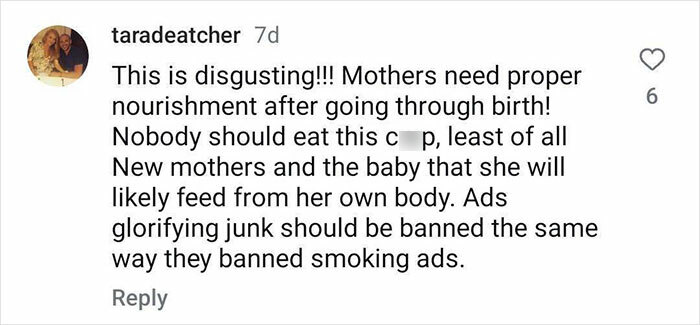A recent Burger King ad featuring new mothers enjoying burgers immediately after childbirth has sparked a heated debate among viewers.
The ad, released on September 26, 2024, proudly states that “over a third of mums surveyed wanted burgers after birth” and showcases exhausted women feeling relieved after receiving the meal from their husbands.
Viewers complained that the ad, while clever, was encouraging unhealthy eating habits. “This is unsettling. After childbirth, moms need nutrients, not a burger loaded with calories and sodium,” one user stated.
While some outlets have reported that the commercial outraged primarily men, it is women who spearheaded the discussion, with some commenters defending the idea and others slamming it.
“This is disgusting! Mothers need proper nourishment after going through birth!” one exclaimed.
A Burger King ad centered around mothers finding relief by eating whoppers immediately after giving birth sparked fierce debate among viewers

Image credits: Change
The clip starts with the caption “September 26, the day most babies are born in the UK,” and features real-life videos of mothers being filmed by their husbands moments before giving birth.
Their anticipation, nervousness, and excitement are all on full display while an old-school song plays in the background with the lyrics “I adore you, more and more, each day.”
At one point, a mom says, “I’m so f–ing hungry,” while the cries of her newborn are heard faintly in the background. Immediately after, a man is seen heading inside the hospital with a recently bought whopper, surprising his wife with the meal.

Image credits: burgerkinguk
“This might just be the cleverest ad for food I’ve ever seen,” wrote one viewer.
“Why didn’t I think of this for my last two kids? Screw the tea and toast! Someone bring me a Burger King after number 3 is born!” another laughed.
Despite the campaign’s ingeniousness, its reception can only be described as mixed. Critics expressed disapproval at not only the promotion of “junk food” and even created a Change.org campaign in protest.
The commercial was inspired by a poll that revealed that 1 in 3 women experienced intense cravings for burgers and fries immediately after giving birth

Image credits: burgerkinguk
The campaign, dubbed “Bundles of Joy,” aims to promote the signature Whopper as the cherry on top of various heartwarming moments in people’s lives.
For this ad, the team based their statement on a study conducted by Mumsnet, a UK-based website aimed at parents, on over 2,000 new mothers. The study revealed that a whopping 39% of them experienced cravings for burgers and fries immediately after giving birth.

Image credits: burgerkinguk
Not only that, but those who received the meal shared that the food helped them forget the exhaustion of labor and provided much-needed relief after the endeavor.
“Mumsnet users frequently tell us that the food they ate after giving birth tasted better than anything else they’d ever eaten,” explained Justine Roberts, CEO of the website, to The Mirror.
“They’re united in the view that new mums deserve to be indulged with whatever they fancy for their first post-birth meal.”
Women experience heightened cravings in response to an increase in hunger-related hormones such as ghrelin and cortisol during labor

Image credits: burgerkinguk
The survey is supported by research, as studies show that women experience a complex rise in a variety of hormones that influence hunger during labor.
These include oxytocin, the hormone that regulates feelings of love, care, and connection; beta-endorphins, responsible for pleasure and feelings of transcendence; epinephrine and norepinephrine, which manage excitement; and prolactin, which promotes breastfeeding.

Image credits: burgerkinguk
However, a combination of cortisol, the stress hormone, and ghrelin, the hunger hormone, is responsible for the sharp increase in hunger. These hormones respond particularly well to meals commonly considered unhealthy.
“Once ingested, fat and sugar-filled foods seem to have a feedback effect that dampens stress-related responses and emotions. These foods really are “comfort” foods in that they seem to counteract stress — and this may contribute to people’s stress-induced craving for those foods,” an article published by Harvard Health stated.
The ad ignited a heated debate among viewers, with one side supporting the commercial and the other criticizing it for connecting what they consider to be “junk food” with pregnancy
One particular exchange among viewers perfectly encapsulated the overall tone of the ad’s reception, with one mother vehemently opposed to the idea and the other defending a woman’s choice to eat whatever they want.
“I think any woman can eat what she wants after birthing her own child!” one exclaimed.
“Nobody should eat this crap, least of all new mothers and the baby that she will likely feed from her own body,” the other replied.
“If you didn’t know, childbirth can be a tad exhausting and emotional; I think the mother can treat herself with any food she so desires,” she argued.
“I know exactly how it can be. I gave birth twice naturally. What I know is that poison is absolutely not what a woman’s body needs.”
“This is irresponsible.” The campaign’s reception remains mixed, with users divided between autonomy and health concerns



















 English (US) ·
English (US) ·